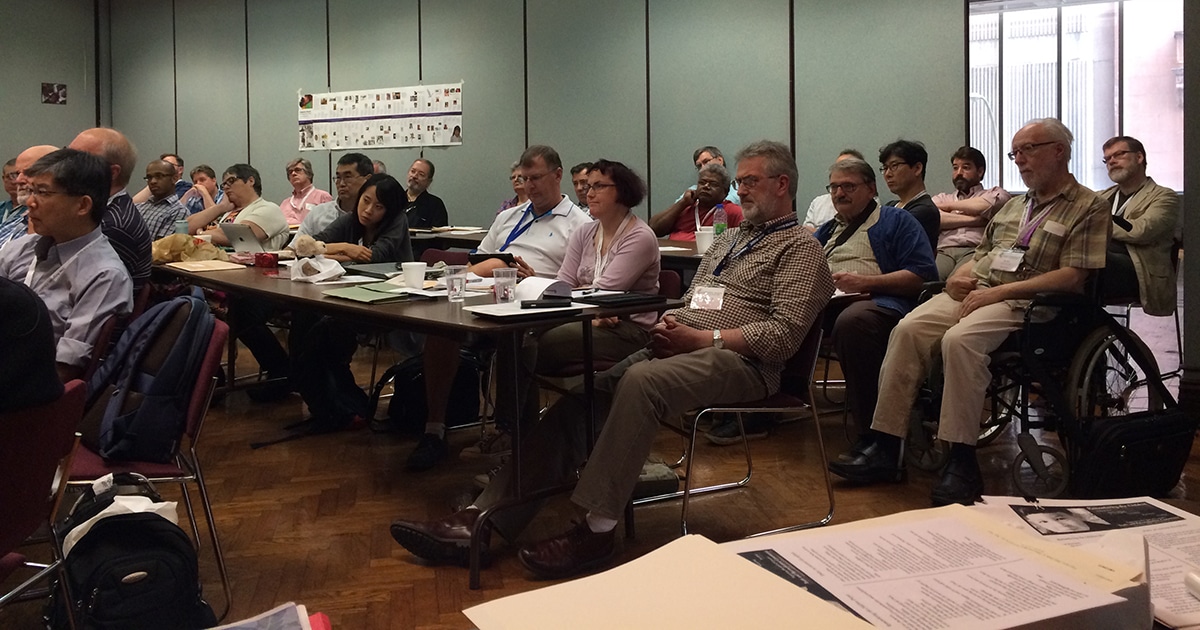The Anglican Church of Canada continues the journey of healing and reconciliation with Canada’s Indigenous peoples. This path away from the legacy of colonialism and racism including the Indian residential school system reflects the unfortunate universal experiences of human conflict and resilience against egregious acts.
Prevailing over such historic divisions through sacred rites and a theology of reconciliation was a major theme at the latest meeting of the International Anglican Liturgical Consultation (IALC), which took place in the diocese of Montreal from Aug. 3-8. The IALC is the official liturgy network for the worldwide Anglican Communion and meets at least once every four years, with the August meeting drawing members from across six continents.
As part of the focus on reconciliation, Archbishop Fred Hiltz, Primate of the Anglican Church of Canada, and National Indigenous Anglican Bishop Mark MacDonald were invited to speak to the Consultation on the Canadian Anglican experience following the church’s role in the administration of Canada’s Indian residential schools.
Using the timeline of the evolving relationship between the church and Indigenous peoples as a framework—and putting forth the suggestion of a liturgy with stations based on each entry in the timeline—Archbishop Hiltz drew a distinction between gestures toward reconciliation, gestures of reconciliation, and gestures in reconciliation.
“We are not yet reconciled, and any gesture that we make has to be in the hope of, in the desire for, in the commitment to being reconciled,” the Primate said, having made that distinction throughout his own experience of the Truth and Reconciliation Commission.
He offered the 1993 apology of then-Primate Michael Peers as a gesture toward reconciliation—being only a first step in that process, as Archbishop Peers acknowledged at the time.
Gestures of reconciliation must grow out of the resulting conversation between the two parties growing into reconciliation. The Primate pointed to the example of Bishop Gordon Beardy’s unexpected embrace of Archbishop Peers and public acceptance of the latter’s apology at the 1995 General Synod.
All of the church’s work since the apology, the Primate added, was in the interest of gestures in reconciliation.
Such efforts include the Anglican Healing Fund; the work of the Sacred Circles and its positive response from the wider church, including the call for a National Indigenous Bishop; constitutional changes such as Canon XXII; supporting local initiatives for self-determination; the establishment of the Primate’s Commission on Discovery, Reconciliation and Justice; and the ongoing incorporation of Indigenous spiritual traditions into Anglican practice.
In his own presentation, Bishop MacDonald discussed reconciliation in the context of issues such as land and treaty rights, as well as disproportionate poverty among Indigenous peoples.
Alongside the Primate and Bishop MacDonald, Fr. Michael Lapsley SMM, Director of the Institute for the Healing of Memories, spoke to the Consultation on his own experience as an anti-apartheid activist in South Africa.
After suffering a letter bomb attack that led to the loss of both hands, sight in one eye and shattered eardrums, Fr. Lapsley committed himself anew to grassroots work around the world in situations of conflict and post-conflict reconciliation. His experiences are documented in The Father Michael Lapsley Story, available online.
“His stories of doing that work around the world just blew us all away and were really, really important,” said the Rev. Dr. Eileen Scully, Director of Faith, Worship and Ministry, who delivered a homily at the public Eucharist summarizing many of the conference themes.
One of the main results of the Consultation was the development of rites toward corporate reconciliation that may be created locally. Ongoing task groups will explore relevant biblical texts and frameworks for promoting healing and reconciliation in situations of enmity, injustice and violence between peoples.
While Archbishop Hiltz cautioned against a “cookie cutter” or rushed approach to reconciliation, Rev. Scully put liturgical rites towards reconciliation in a wider context.
“One of the principles is such liturgical events do not in themselves create a reconciliation, but assist us to pray within the spirit of reconciliation that God gives to us, that we walk towards right relationship with each other,” she said.
“Everything starts in the gift of God’s reconciling actions in Christ, reconciling us with God, and calling us into right relationship with each other.”
View the official communiqué from the 2015 IALC meeting.
Interested in keeping up-to-date on news, opinion, events and resources from the Anglican Church of Canada? Sign up for our email alerts .

